人教版PEP五年级英语下册各单元知识点完整版
PEP五年级英语下册Unit1-6重点知识小结

Unit 1 This Is My Daydo morning exercises晨练eat breakfast吃早饭have english class上英语课play sports进行体育运动eat dinner吃晚饭when什么时候evening夜晚;晚上get up起床at在……点钟usually通常;一般noon中午climb mountains爬山go shopping购物;买东西play the piano弹钢琴visit grandparents看望祖父母go hiking去远足weekend周末often经常sometimes有时候话题1:日常生活时态:一般现在时1.When do you do morning exercises? 你什么时候做早操?I usually do morning exercises at 8:00. 我经常八点钟做早操。
(I usually get up at 12:00 at noon . 我经常在中午十二点起床。
) 2.When do you eat dinner ? 你什么时候吃晚餐?I eat dinner at 7:00 in the evening. 我在晚上七点种吃晚餐。
3.When is the best time to go to Beijing? Fall. 最好在什么时候去北京?秋天。
Unit 2 My Favourite Seasonspring春天summer夏天fall秋天winter冬天season季节which哪一个best最;极swim游泳fly kites放风筝skate滑冰make a snowman堆雪人plant trees种树why为什么because因为sleep 睡觉话题2:季节时态:一般现在时1.Which season do you like best ? I like spring best.(Spring.)你最喜欢是什么季节?我最喜欢春季。
PEP小学英语五年级下册各单元知识重点总结
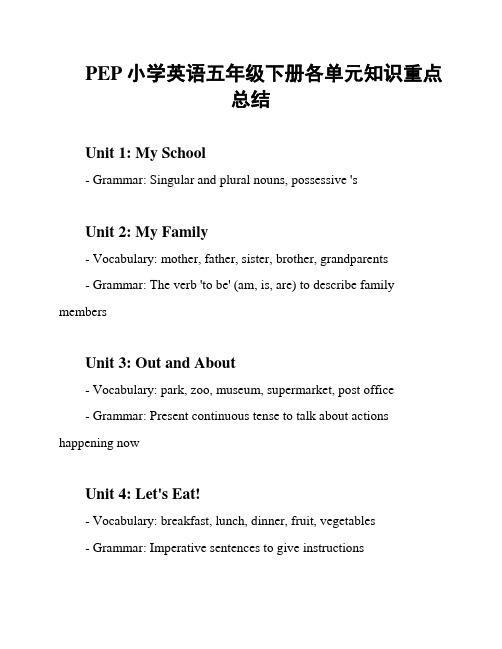
PEP小学英语五年级下册各单元知识重点总结Unit 1: My School- Grammar: Singular and plural nouns, possessive 'sUnit 2: My Family- Vocabulary: mother, father, sister, brother, grandparents- Grammar: The verb 'to be' (am, is, are) to describe family membersUnit 3: Out and About- Vocabulary: park, zoo, museum, supermarket, post office- Grammar: Present continuous tense to talk about actions happening nowUnit 4: Let's Eat!- Vocabulary: breakfast, lunch, dinner, fruit, vegetables- Grammar: Imperative sentences to give instructionsUnit 5: At the Farm- Vocabulary: farmer, barn, cow, pig, chicken- Grammar: There is/There are to talk about existenceUnit 6: Our Town- Vocabulary: street, hospital, police station, fire station, city- Grammar: Prepositions of place (in, on, under, behind, next to)Unit 7: Weather Report- Vocabulary: sunny, cloudy, rainy, snowy, windy- Grammar: Adjectives to describe weatherUnit 8: Fun with Friends- Vocabulary: play, sing, dance, swim, draw- Grammar: Simple present tense to talk about daily activitiesUnit 9: In the Ocean- Vocabulary: fish, dolphin, shark, octopus, seahorse- Grammar: Wh- questions using 'What' and 'Where'Unit 10: Happy Holidays- Vocabulary: Christmas, Easter, Halloween, New Year's Day, Thanksgiving- Grammar: Use of can for ability。
(完整版)人教版小学PEP英语五年级下册知识点归纳
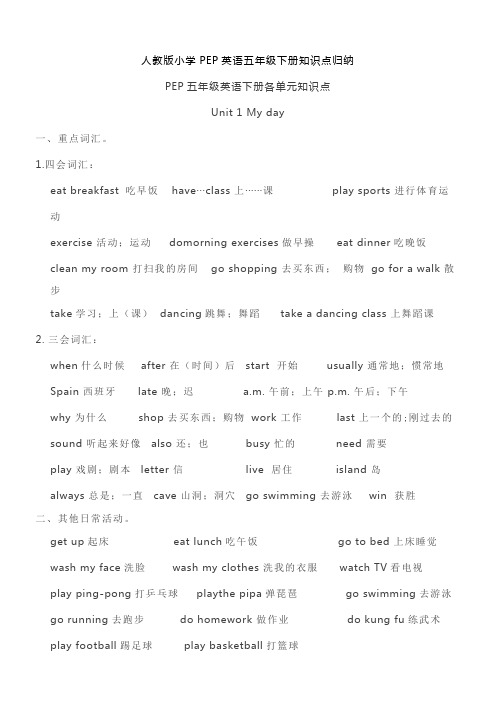
人教版小学PEP英语五年级下册知识点归纳PEP五年级英语下册各单元知识点Unit 1 My day一、重点词汇。
1.四会词汇:eat breakfast 吃早饭 have···class 上······课play sports 进行体育运动exercise 活动;运动 domorning exercises做早操eat dinner吃晚饭clean my room 打扫我的房间go shopping 去买东西;购物go for a walk 散步take学习;上(课) dancing跳舞;舞蹈 take a dancing class 上舞蹈课2. 三会词汇:when什么时候after 在(时间)后start 开始usually 通常地;惯常地Spain 西班牙late 晚;迟 a.m. 午前;上午 p.m. 午后;下午why 为什么shop 去买东西;购物work 工作last 上一个的;刚过去的sound 听起来好像also 还;也busy 忙的 need 需要play 戏剧;剧本letter 信live 居住island 岛always 总是;一直cave 山洞;洞穴go swimming 去游泳 win 获胜二、其他日常活动。
get up起床 eat lunch吃午饭 go to bed 上床睡觉wash my face洗脸 wash my clothes 洗我的衣服 watch TV看电视play ping-pong打乒乓球 playthe pipa弹琵琶 go swimming去游泳go running去跑步 do homework 做作业 do kung fu练武术play football踢足球 play basketball打篮球三、频度副词。
always总是,一直(100%) usually通常(80%)often 经常(60%) sometimes(30%)有时四、疑问词。
新人教版PEP 【小学五年级英语下册】 单元知识点 归纳总结

新人教版PEP 【小学五年级英语下册】单元知识点归纳总结Unit 1 My DayIn this unit。
we learn some core vocabulary words。
phrases。
and XXX.Core Vocabulary:1.Verbs: take (studying)。
go to (class)2.Nouns: dancing。
exercise。
sports3.Phrases: do morning exercises。
eat breakfast。
play sports。
eat dinner。
go for a walk。
go shopping。
clean my room。
take a dancing class。
have a classXXX Vocabulary:1.Verbs: start。
shop。
work。
need。
live。
win。
sound2.Nouns: Spain。
play。
letter。
island。
cave3.ns: after4.XXX: when。
XXX。
a.m。
p.m。
why。
last。
also。
busy5.nal Vocabulary: frequency adverbs (always。
usually。
sometimes)Phrases:watch TV。
eat lunch。
go to bed。
go swimming。
go home。
go to schoolCore Sentence Structure:When do you do morning exercises?" "At 7 o'clock."XXX phrase is "good job" to praise XXX.Which season do you like best。
I like winter best。
This sentence means "which one do you like the most" and "like。
人教版小学五年级英语下册重点知识归类
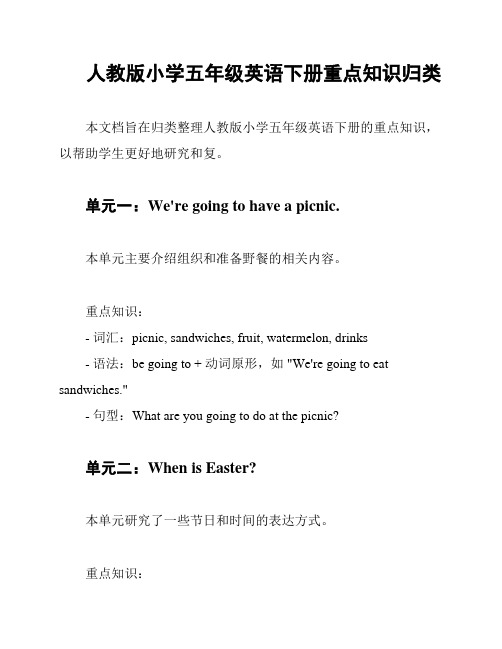
人教版小学五年级英语下册重点知识归类本文档旨在归类整理人教版小学五年级英语下册的重点知识,以帮助学生更好地研究和复。
单元一:We're going to have a picnic.本单元主要介绍组织和准备野餐的相关内容。
重点知识:- 词汇:picnic, sandwiches, fruit, watermelon, drinks- 语法:be going to + 动词原形,如 "We're going to eat sandwiches."- 句型:What are you going to do at the picnic?单元二:When is Easter?本单元研究了一些节日和时间的表达方式。
重点知识:- 词汇:Easter, Christmas, New Year's Day, Halloween- 语法:疑问词when和具体时间的表达,如 "When is Easter?"- 句型:When is Christmas?单元三:Do you want to go to a movie?本单元研究了表达意愿和邀请的相关内容。
重点知识:- 词汇:movie, park, zoo, museum, swimming pool- 语法:do you want to + 动词原形,如 "Do you want to go to a movie?"- 句型:Do you want to go to the park?单元四:Can you swim?本单元介绍了一些体育运动和能力的表达方式。
重点知识:- 词汇:swim, run, jump, skate, ride- 语法:can + 动词原形,如 "Can you swim?"- 句型:Can you ride a bike?单元五:What's the matter with you?本单元主要研究了描述身体状况和感受的表达方式。
人教版PEP英语五年级下册Unit1-My-Day知识点归纳与练习(含答案)
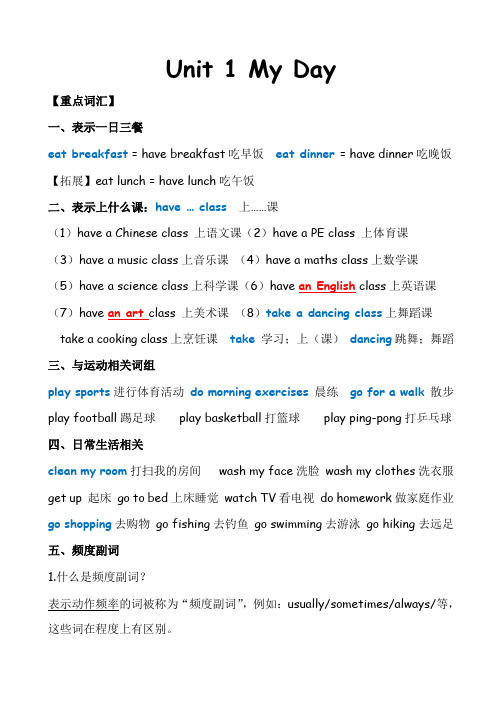
Unit 1 My Day【重点词汇】一、表示一日三餐eat breakfast = have breakfast吃早饭eat dinner= have dinner吃晚饭【拓展】eat lunch = have lunch吃午饭二、表示上什么课:have … class 上……课(1)have a Chinese class 上语文课(2)have a PE class 上体育课(3)have a music class上音乐课(4)have a maths class上数学课(5)have a science class上科学课(6)have an English class上英语课(7)have an art class 上美术课(8)take a dancing class上舞蹈课take a cooking class上烹饪课take学习;上(课)dancing跳舞;舞蹈三、与运动相关词组play sports进行体育活动do morning exercises晨练go for a walk散步play football踢足球play basketball打篮球play ping-pong打乒乓球四、日常生活相关clean my room打扫我的房间wash my face洗脸wash my clothes洗衣服get up 起床go to bed上床睡觉watch TV看电视do homework做家庭作业go shopping去购物go fishing去钓鱼go swimming去游泳go hiking去远足五、频度副词1.什么是频度副词?表示动作频率的词被称为“频度副词”,例如:usually/sometimes/always/等,这些词在程度上有区别。
2.常见频度副词按频率大小排列如下:always(100%)>usually(80%)>often(60%)>sometimes(20%~40%)> never (0%)3.注意频度副词的使用位置:①We usually go to school at seven in the morning.②What do you often do on the weekend?六、常见时间的表达方式1.at + 具体的几点钟;at noon在中午;at night在晚上2.in +月份/季节/早中晚例如:in the morning/afternoon/evening3.关于on表示时间的几种情况:①on + 星期几;②on + 几月几日;③on the weekend在周末;④on Monday morning星期一早上。
PEP小学英语五年级下册各单元重点内容概述
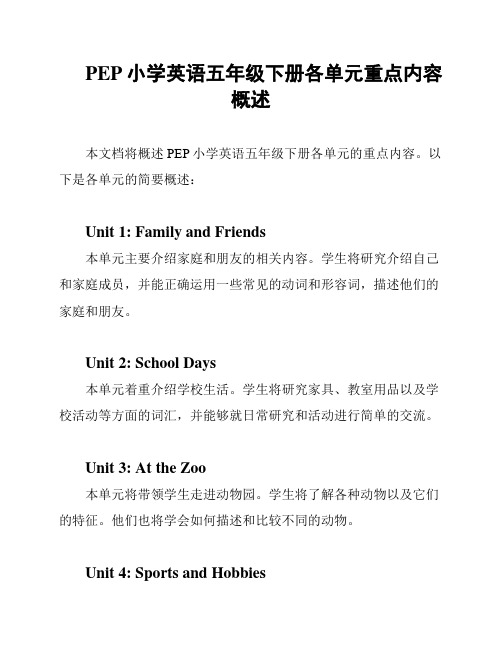
PEP小学英语五年级下册各单元重点内容概述本文档将概述PEP小学英语五年级下册各单元的重点内容。
以下是各单元的简要概述:Unit 1: Family and Friends本单元主要介绍家庭和朋友的相关内容。
学生将研究介绍自己和家庭成员,并能正确运用一些常见的动词和形容词,描述他们的家庭和朋友。
Unit 2: School Days本单元着重介绍学校生活。
学生将研究家具、教室用品以及学校活动等方面的词汇,并能够就日常研究和活动进行简单的交流。
Unit 3: At the Zoo本单元将带领学生走进动物园。
学生将了解各种动物以及它们的特征。
他们也将学会如何描述和比较不同的动物。
Unit 4: Sports and Hobbies本单元将探讨体育和爱好。
学生将研究描述不同体育运动和爱好的词汇,并能够就自己的喜好进行表达。
Unit 5: Food and Health本单元将关注食物和健康。
学生将研究各种食物的名称和描述,同时也会探讨健康和饮食惯的重要性。
Unit 6: My Neighborhood本单元将介绍学生所在的社区。
学生将研究描述自己的住所和周围环境的词汇,并能够就不同位置进行简单的指示。
Unit 7: Weather and Seasons本单元将涉及天气和季节。
学生将研究各种天气状况的词汇和描述,并了解不同季节的特点。
Unit 8: Holidays and Festivals本单元将介绍各种假期和节日。
学生将研究诸如春节、圣诞节等节日的名称和庆祝活动,并能够就个人喜好进行交流。
Unit 9: On the Farm本单元将带领学生了解农场。
学生将研究农场里各种动物和农作物的名称,并能够描述它们的特点。
Unit 10: Travel and Adventure本单元将聚焦旅行和冒险。
学生将研究描述不同交通工具以及旅行地点的词汇,并能够描述自己的旅行经历。
以上是PEP小学英语五年级下册各单元的重点内容概述。
【口袋书】人教版PEP五年级下册英语 基础知识汇总

人教版PEP五年级下册基础知识汇总Unit 1 My day.重点单词:[四会]dancing 跳舞;舞蹈exercise 活动;运动take 学习;上(课)[三会]after 在(时间)后start 开始usually 通常地;惯常地Spain 西班牙late 晚;迟a.m.午前;上午p.m.午后;下午why 为什么shop 去买东西;购物work 工作last 上一个的;刚过去的sound 听起来好像also 还;也busy 忙的need 需要play 戏剧;剧本letter 信live 居住island 岛always 总是;一直cave 山洞;洞穴win 获胜重点短语:eat breakfast 吃早饭have … class 上…课play sports 进行体育运动do morning exercises 做早操eat dinner 吃晚饭clean my room 打扫我的房间go for a walk 散步go shopping 去买东西;购物take a dancing class 上舞蹈课go swimming 去游泳start class 开始上课last night 昨天晚上after lunch 午饭以后a lot of fun 许多乐趣live on an island 住在一座岛上be good at sports 擅长体育运动字母组合cl 发/kl/ 音:clean 打扫clock 钟class 课;班级clever 聪明的clock 钟字母组合pl 发/pl/ 音:plate 盘子;碟子eggplant 茄子please 请play 玩耍;戏剧重点句型:1.询问别人什么时候做某事的问句及回答:-- When do/does + 主语+ 动词(短语)原形(+ 其他)?-- 主语(+ 频度副词)+ 动词(短语)原形/ 第三人稀单数形式+ at + 具体时间/ At + 具体时间.-- When do you get up? 你什么时候起床?-- I get up at 5 o'clock. 我5点起床。
人教版PEP小学英语五年级下册知识点汇总(最新)
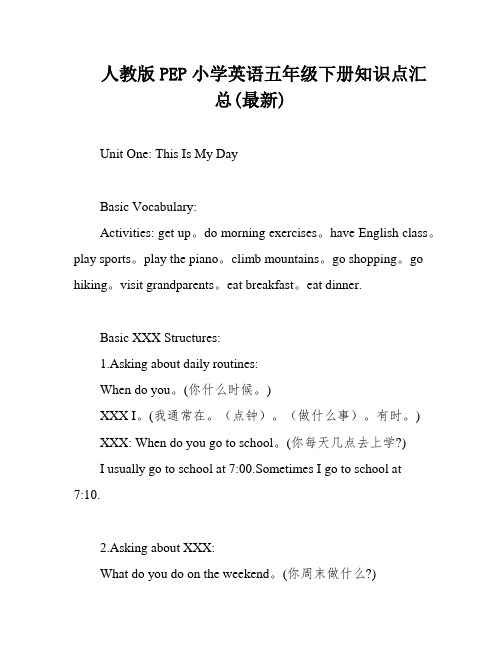
人教版PEP小学英语五年级下册知识点汇总(最新)Unit One: This Is My DayBasic Vocabulary:Activities: get up。
do morning exercises。
have English class。
play sports。
play the piano。
climb mountains。
go shopping。
go hiking。
visit grandparents。
eat breakfast。
eat dinner.Basic XXX Structures:1.Asking about daily routines:When do you。
(你什么时候。
)XXX I。
(我通常在。
(点钟)。
(做什么事)。
有时。
)XXX: When do you go to school。
(你每天几点去上学?)I usually go to school at 7:00.Sometimes I go to school at7:10.2.Asking about XXX:What do you do on the weekend。
(你周末做什么?)XXX I。
(我通常/经常。
有时。
)XXX: What do you do on the weekend?I often play XXX I go shopping with my mom.3.Introducing one's own habits:Every weekend。
I go hiking。
(我每个周末远足。
)Every day。
I do my homework at 8:00 in the evening。
(我每天晚上8点做作业。
)4.Asking XXX:What do you do。
(你是干什么的?)Time:morning。
afternoon。
evening。
noon。
at night。
6:00.on Sunday。
人教版PEP小学英语五年级下册知识点汇总(最新)
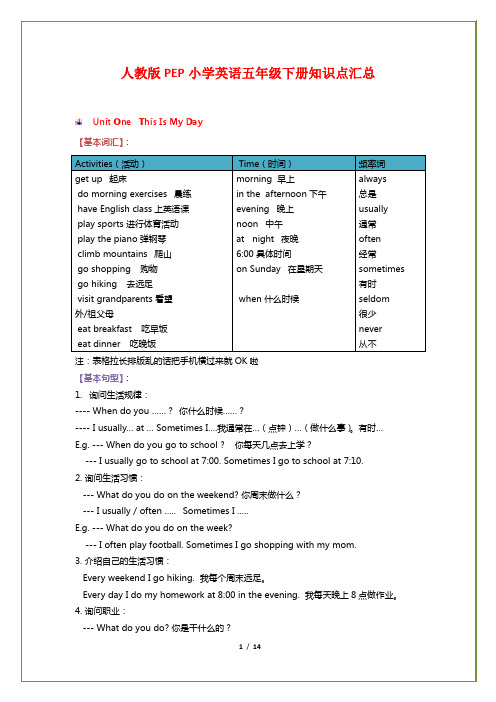
人教版PEP小学英语五年级下册知识点汇总Unit One This Is My Day【基本词汇】:Activities(活动) Time(时间)频率词get up 起床do morning exercises 晨练 have English class上英语课 play sports 进行体育活动 play the piano 弹钢琴climb mountains 爬山go shopping 购物go hiking 去远足visit grandparents 看望外/祖父母eat breakfast 吃早饭eat dinner 吃晚饭morning 早上in the afternoon下午evening 晚上noon 中午at night 夜晚6:00 具体时间on Sunday 在星期天when 什么时候always总是usually通常often经常sometimes有时seldom很少never从不注:表格拉长排版乱的话把手机横过来就OK啦【基本句型】:1. 询问生活规律:---- When do you ……?你什么时候……?---- I usually… at …Sometimes I….我通常在…(点钟)…(做什么事)。
有时…E.g. --- When do you go to school ? 你每天几点去上学?--- I usually go to school at 7:00. Sometimes I go to school at 7:10.2. 询问生活习惯:--- What do you do on the weekend? 你周末做什么?--- I usually / often ….. Sometimes I …..E.g. --- What do you do on the week?--- I often play football. Sometimes I go shopping with my mom.3. 介绍自己的生活习惯:Every weekend I go hiking. 我每个周末远足。
【人教版】小学PEP英语五年级下册第四单元知识点归纳

人教版小学PEP英语五年级下册知识点归纳二、用序数词表示具体的日期在英语中,“几月几日”可以先说“月”,再说“日”,其中“日”要用序数词,书写时序数词前可以有“the”,也可以没有。
但读日期时,the必须读出来。
如果要表示某年某月某日,通常按照“月、日、年”的顺序。
例如:March 3rd 读法是:March the third翻译是:3月3日。
June1st,2014 读法是:Junethe first, twothousand and fourteen翻译是:2014年6月1日。
三、基数词变序数词的口诀记忆基变序有规律,结尾加上th;一二三特殊记,结尾各是t,d,d;八减t九去e,f来把ve替;y改为ie,结尾仍有th;若是遇到几十几,只变个位就可以。
四、重点句型1、询问别人具体日期的句型及回答。
句型结构:问:When is+节日/活动?(···是哪天?)答:It’s on+月份+序数词。
·(··月···日)例:When is Children’s Day?(儿童节是哪天?)答:It’s on June 1st. (6月1日)2、询问生日的句型及回答句型结构:问:When is+某人的+birthday? (···生日是哪天?)答:It’s on+具体的日期。
例:问:When is your grandma’s birthday?(你奶奶的生日是哪天?)答:Her birthday is on June16th.(她的生日是6月16日。
)问:When is Miss White’sbirthday?(怀特小姐的生日是哪天?)答:It’s on July 1st. (7月1日。
)五、四会句子:When is April Fool’s Day ? 愚人节是哪天?It’s on April 1st . 它在4月1日。
新人教版PEP五年级英语下册各单元知识点总结
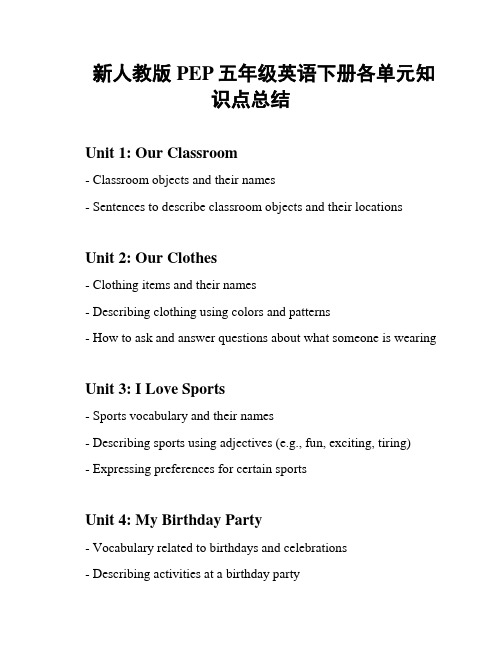
新人教版PEP五年级英语下册各单元知识点总结Unit 1: Our Classroom- Classroom objects and their names- Sentences to describe classroom objects and their locationsUnit 2: Our Clothes- Clothing items and their names- Describing clothing using colors and patterns- How to ask and answer questions about what someone is wearingUnit 3: I Love Sports- Sports vocabulary and their names- Describing sports using adjectives (e.g., fun, exciting, tiring)- Expressing preferences for certain sportsUnit 4: My Birthday Party- Vocabulary related to birthdays and celebrations- Describing activities at a birthday party- Expressing likes and dislikes about different party elementsUnit 5: At the Farm- Vocabulary related to farm animals and their names- Describing farm animals using adjectives (e.g., big, small, noisy) - Describing activities at a farm (e.g., feeding animals, milking cows)Unit 6: A Fun Day Out- Vocabulary related to amusement park rides and activities- Describing activities and experiences at an amusement park- Expressing likes and dislikes about different rides and activitiesUnit 7: A Friendly Letter- Vocabulary related to writing a letter (e.g., greeting, closing, signature)- Structure of a friendly letter- Writing a letter to a friend, describing personal experiences or activitiesUnit 8: Our Pets- Vocabulary related to pets and their names- Describing pets using adjectives (e.g., cute, friendly, playful)- Talking about responsibilities and caring for petsUnit 9: Our Earth- Vocabulary related to the environment and nature- Describing different natural elements (e.g., mountains, rivers, plants)- Expressing concerns and suggesting actions to protect the environmentUnit 10: Fun with Art- Vocabulary related to art and artistic activities- Describing different art forms (e.g., drawing, painting, sculpting) - Talking about personal preferences for different art activitiesUnit 11: Let's Travel- Vocabulary related to travel and transportation- Describing different modes of transportation (e.g., car, train, airplane)- Talking about travel experiences and preferences for different destinationsUnit 12: Healthy Habits- Vocabulary related to health and healthy habits- Describing different healthy habits (e.g., exercise, balanced diet, enough sleep)- Talking about personal choices and habits for a healthy lifestyle。
人教版PEP英语五年级下册第一单元知识总结
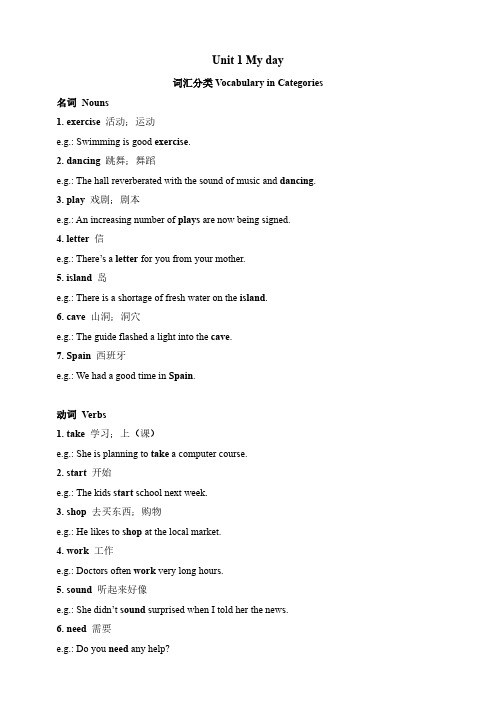
Unit 1 My day词汇分类Vocabulary in Categories 名词Nouns1. exercise活动;运动e.g.: Swimming is good exercise.2. dancing跳舞;舞蹈e.g.: The hall reverberated with the sound of music and dancing.3. play戏剧;剧本e.g.: An increasing number of plays are now being signed.4. letter信e.g.: There’s a letter for you from your mother.5. island岛e.g.: There is a shortage of fresh water on the island.6. cave山洞;洞穴e.g.: The guide flashed a light into the cave.7. Spain西班牙e.g.: We had a good time in Spain.动词Verbs1. take学习;上(课)e.g.: She is planning to take a computer course.2. start开始e.g.: The kids start school next week.3. shop去买东西;购物e.g.: He likes to shop at the local market.4. work工作e.g.: Doctors often work very long hours.5. sound听起来好像e.g.: She didn’t sound surprised when I told her the news.6. need需要e.g.: Do you need any help?7. live居住e.g.: We used to live in London.8. win获胜e.g.: She loves to win an argument.形容词Adjectives1. last上一个的;刚过去的e.g.: The last time I saw him was in May.2. busy忙的e.g.: Are you busy tonight?3. late晚;迟e.g.: Here is a late news flash.副词Adverbs1. usually通常地;惯常地e.g.: I’m usually home by 6 o’clock.2. also还;也e.g.: Prevention also plays a central role in traditional medicine.3. always总是;一直e.g.: We’re not always this busy!4. when什么时候;何时e.g.: When did you last see him?5. why为什么e.g.: Why were you late?介词Prepositions1. after在(时间)后e.g.: We’ll leave after lunch.其他Others1. a.m.午前;上午e.g.: It starts at 10 a.m.2. p.m.午后;下午e.g.: The appointment is at 3 p.m.短语Expression1. eat breakfast吃早饭e.g.: I’d rather eat breakfast and lunch at the hotel and then spend much money on a delicious supper.2. have … class上……课e.g.: I have a PE class this afternoon.3. play sports进行体育运动e.g.: Many people go dancing or play sports.4. do morning exercise做早操e.g.: Every morning several dozens of people gather in the park to do morning exercise.5. eat dinner吃晚饭e.g.: In protest, he refused to eat dinner that night.6. clean my room打扫我的房间e.g.: My father gets me to clean my room every day!7. go for a walk散步e.g.: Let’s go for a walk.8. go shopping去买东西;购物e.g.: All you ever want to do is go shopping!9. take a dancing class上舞蹈课e.g.: His daughter takes a dancing class every Saturday morning.10. go swimming去游泳e.g.: How often do you go swimming?对话Dialogues1.A: When do you get up?B: I often get up at 7 o’clock.A: When do you start class in Spain?B: Usually at 9 o’clock.A: I always start class at 8 o’clock.2.A: What do you do on the weekend?B: I often clean my room and wash my clothes. Sometimes I play ping-pong with Zhang Peng.3.A: Today is Sunday! What do you do on the weekend?B: I often go shopping with my mum.4.A: When do you finish class in the morning?B: We finish class at 1 o’clock. Then we eat lunch at home.A: Wow! When do you go back to school after lunch?B: At 2:30. Classes start at 3 o’clock.A: When do you usually eat dinner in Spain?B: Usually at 9:30 or 10 o’clock.A: Wow! That’s too late!5.A: Why are you shopping today?B: My mum worked last night. So I’m shopping today.A: Good girl! So what do you do on the weekend?B: I often watch TV and play ping-pong with my father.A: That sounds like a lot of fun.B: Yes, but I’m also hard-working. I usually wash my clothes. Sometimes I cook dinner.A: You’re so busy! You need a robot to help you!6.A: It’s Saturday now. Zoom, I’m always very busy.B: Why?A: Let me see. From Monday to Wednesday, I usually collect nuts in the afternoon. B: What else?A: On Thursday, I often dry my nuts in the sun. On Friday, I eat nuts with my friends. B: What do you usually do on the weekend?A: I often watch TV, but this weekend I have a show. I’ll play the pipa.B: When?A: Saturday, at 12 o’clock. Oh, no!核心表达Expressions1. When do you finish class in the morning?你们上午的课到几点结束?2. We finish class at 1 o’clock.我们一点钟结束上午的课。
(完整版)人教版PEP五年级下册英语知识点复习总结
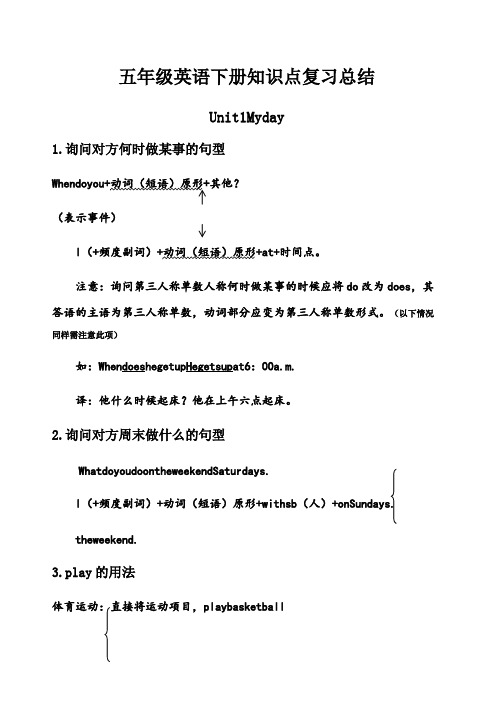
五年级英语下册知识点复习总结
Unit1Myday
1.询问对方何时做某事的句型
Whendoyou+动词(短语)原形+其他? (表示事件)
I(+频度副词)+动词(短语)原形+at+时间点。 注意:询问第三人称单数人称何时做某事的时候应将 do 改为 does,其 答语的主语为第三人称单数,动词部分应变为第三人称单数形式。(以下情况
同样需注意此项)
如:WhendoeshegetupHegetsupat6:00a.m. 译:他什么时候起床?他在上午六点起床。
2.询问对方周末做什么的句型
WhatdoyoudoontheweekendSaturdays. I(+频度副词)+动词(短语)原形+withsb(人)+onSundays. theweekend.
(2)在基数词后加 th:除去 first,second,third,其他基数词变序数词一般 直接在其后加 th。注意 five 与 twelve 要先把 ve 变 f,再加 th;eight 直接加 h;nine 去 e 再加 th。
(3)整十序数词以 ieth 结尾:整十位的序数词先将十位整数词尾的 y 变为 i, 再加 eth。如:twenty-twentieth。
The
注意:play-plays 因为 a 是元音 3)以 ch,sh,s,x 或 o 结尾的动词,在后面加-es; 例如 teach-teacheswash-washesdo-doesgo-goesfix-fixes
4)不规则的; 例如 have-has
5.by 的用法
人教版PEP五年级英语下册各单元语法点

人教版PEP五年级英语下册各单元语法点Unit 1: What Does She Do?- 一般现在时:用于描述日常活动或惯。
主语为第三人称单数时,动词加-s或-es。
- 观察寻找规律:第三人称单数的动词加-s或-es。
- Be动词+动词-ing:用于描述正在进行的动作。
主语为第三人称单数时,be动词用is。
- 一般现在时的否定句:在动词前面加don't/doesn't。
- 一般现在时的疑问句:将do/does置于主语之前。
Unit 2: Can You Run?- Can的用法:用于表示能力和询问对方是否能够做某事。
- Can的否定形式:在can后面加not或缩略形式can't。
- Can的疑问形式:将can置于句首。
Unit 3: What Are They Doing?- 现在进行时:用于描述正在进行的动作。
动词加-ing。
- 现在进行时的否定句:在be动词后面加not。
- 现在进行时的疑问句:将be动词置于句首。
Unit 4: I'm Sitting at the Front.- 介词短语表示地点:用于描述人或物所在的位置。
- 介词on、in、under、behind、in front of、next to等的用法。
Unit 5: What Are You Going to Do?- be going to的用法:表示将来要做的事情。
- be going to的否定形式:在be动词后面加not。
- be going to的疑问形式:将be动词置于句首。
Unit 6: It's Raining!- 祈使句:用于表示请求、命令或建议。
动词原形作谓语。
- 祈使句的否定形式:在动词前面加don't。
- 祈使句的疑问形式:用Do开头。
Unit 7: How Often Do You Exercise?- 表示频率的副词:用于描述动作发生的频率。
- always, usually, often, sometimes, hardly ever, never等的用法。
人教版五年级英语下册全册知识点总结
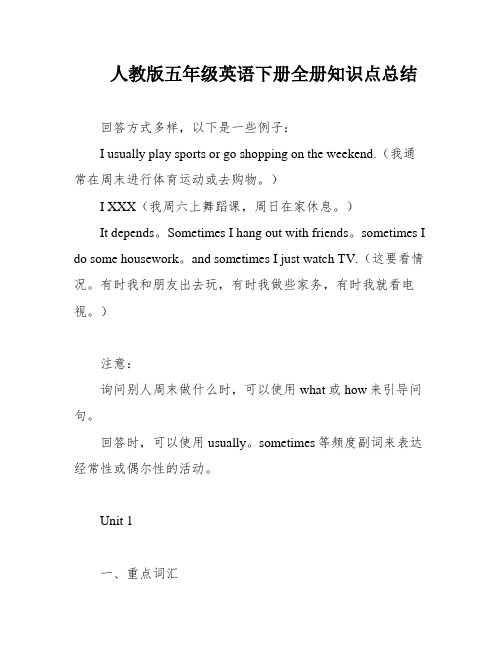
人教版五年级英语下册全册知识点总结回答方式多样,以下是一些例子:I usually play sports or go shopping on the weekend.(我通常在周末进行体育运动或去购物。
)I XXX(我周六上舞蹈课,周日在家休息。
)It depends。
Sometimes I hang out with friends。
sometimes I do some housework。
and sometimes I just watch TV.(这要看情况。
有时我和朋友出去玩,有时我做些家务,有时我就看电视。
)注意:询问别人周末做什么时,可以使用what或how来引导问句。
回答时,可以使用usually。
sometimes等频度副词来表达经常性或偶尔性的活动。
Unit 1一、重点词汇吃早餐:eat breakfast 上······课:have。
class进行体育运动:play sports做早操:do morning exercises 打扫我的房间:clean my room 去购物:go shopping舞蹈:dancing上午:a.m.通常地:usually二、其他日常活动起床:get up上床睡觉:go to bed活动,运动:exercise吃晚饭:eat XXX散步:go for a walk研究,上(课):XXX上舞蹈课:take a dancing class下午:p.m.吃午饭:eat XXX洗脸:XXX洗我的衣服:XXX看电视:watch TV打乒乓球:play ping-pong弹琵琶:play the pipa去游泳:go swimming去跑步:go running做作业:do homework练武术:do XXX踢足球:play football打篮球:play basketball三、语音cl→ [cl]:clean。
人教版PEP小学英语五年级下册unit1至unit3知识点归纳
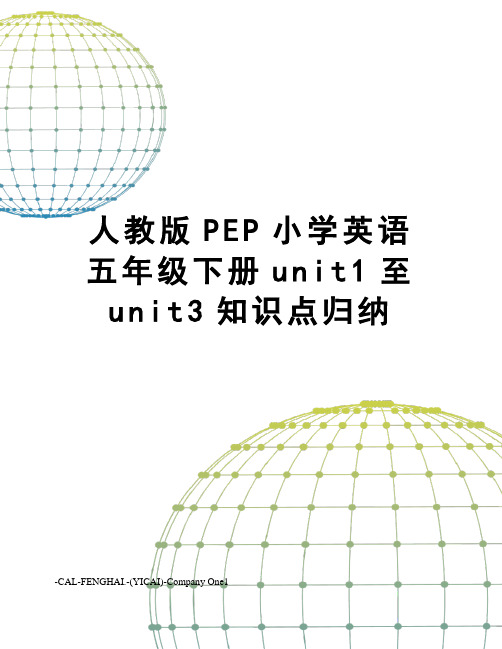
人教版P E P小学英语五年级下册u n i t1至u n i t3知识点归纳-CAL-FENGHAI.-(YICAI)-Company One1五年级下册Unit 1-3重点难点、单元单词、短语和知识点知识梳理第一单元知识点一、主要单词:do morning exercises晨练,做早操 eat breakfast吃早饭 have English class上英语课 play sports进行体育活动 eat dinner吃晚饭 eat lunch吃午饭 climb mountains爬山 go shopping购物,买东西 play the piano弹钢琴 visit grandparents看望(外)祖父母 go hiking去远足二、主要句子:When do you eat dinner你什么时候吃晚饭I eat dinner at 7:00 in the evening.我晚上七点吃晚饭。
When do you get up你什么时候起床I usually get up at 12:00 at noon.我通常在中午12点起床。
What do you do on the weekend你在周末干什么Usually I watch TV and go shopping.我通常看电视和购物。
Sometimes I visit my grandparents.有时候我去看望我的外祖父母。
I often play football.我经常踢足球。
Sometimes I go hiking.有时候我去远足。
三、同义词eat breakfast—have breakfast eat lunch—have luncheat dinner—have dinner play sports—do sports usually—often复数形式:policeman—policemen policewoman—policewomen现在分词:tell—telling三单:say—says同义句:What do you do ---What are you你是干什么的四、表示频度的副词:always总是,一直 usually通常,常常 often经常 sometimes有时候五、以复数形式出现的词组:visit grandparents plant trees介词后跟表示时间的词语时,表示在某年、某月、某个季节,某个时候(在上午,在下午,在晚上)用in;表示在某一天,在星期几用on,在具体的几点几分用at.七、too 和either的用法区别:too和either都是“也”的意思,但too用于肯定句,either用于否定句。
人教版PEP五年级英语下册各单元词汇点
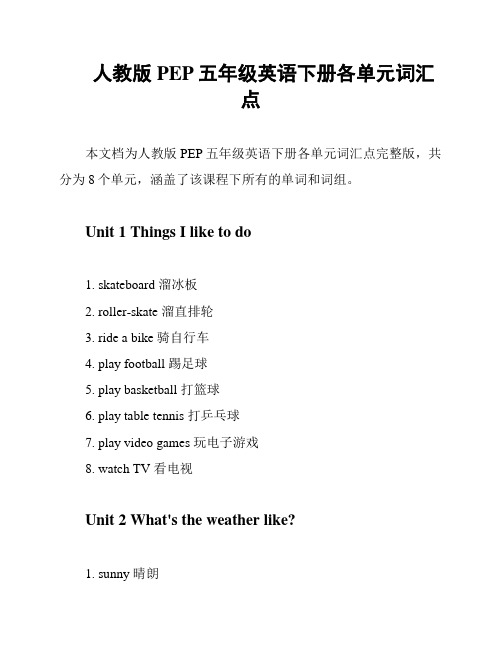
人教版PEP五年级英语下册各单元词汇点本文档为人教版PEP五年级英语下册各单元词汇点完整版,共分为8个单元,涵盖了该课程下所有的单词和词组。
Unit 1 Things I like to do1. skateboard 溜冰板2. roller-skate 溜直排轮3. ride a bike 骑自行车4. play football 踢足球5. play basketball 打篮球6. play table tennis 打乒乓球7. play video games 玩电子游戏8. watch TV 看电视Unit 2 What's the weather like?1. sunny 晴朗2. cloudy 多云3. rainy 下雨4. snowy 下雪5. windy 有风6. hot 热7. cold 冷Unit 3 At a pet shop1. parrot 鹦鹉2. rabbit 兔子3. hamster 仓鼠4. cat 猫5. dog 狗6. fish 鱼7. turtle 乌龟Unit 4 My family 1. grandfather 爷爷2. grandmother 奶奶3. father 爸爸4. mother 妈妈5. older brother 哥哥6. older sister 姐姐7. younger brother 弟弟8. younger sister 妹妹Unit 5 My school day1. classroom 教室2. library 图书馆3. playground 操场4. art room 美术室5. music room 音乐室7. canteen 食堂8. restroom 卫生间Unit 6 Fun with nature1. flowers 花2. grass 草3. trees 树木4. leaves 叶子5. rocks 石头6. mountains 山7. rivers 河流Unit 7 Countryside holidays1. tent 帐篷2. sleeping bag 睡袋3. campfire 篝火4. fishing rod 钓鱼竿5. boat 船6. bike 自行车7. camera 照相机Unit 8 Where's my schoolbag?1. schoolbag 书包2. desk 课桌3. chair 椅子4. blackboard 黑板5. pencil case 铅笔盒6. ruler 尺子7. eraser 橡皮擦以上为本文档的单词和词组列表,希望能够帮助学习人教版PEP五年级英语下册的同学们更好地掌握课程内容。
人教PEP版小学五年级下册英语第二单元知识点
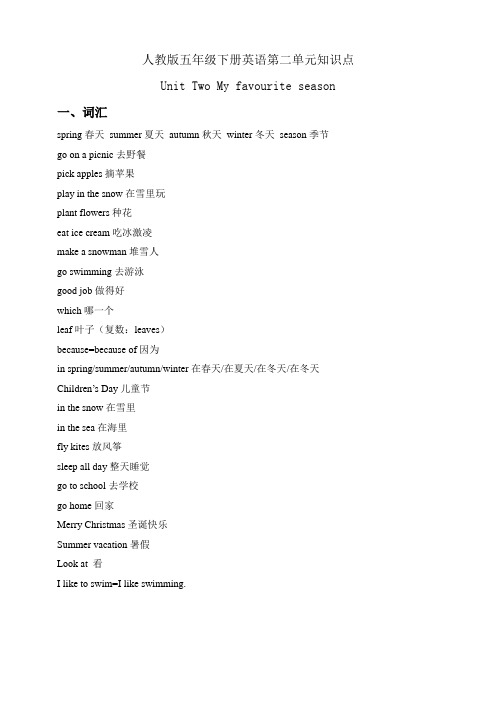
人教版五年级下册英语第二单元知识点Unit Two My favourite season 一、词汇spring春天summer夏天autumn秋天winter冬天season季节go on a picnic去野餐pick apples摘苹果play in the snow在雪里玩plant flowers种花eat ice cream吃冰激凌make a snowman堆雪人go swimming去游泳good job做得好which哪一个leaf叶子(复数:leaves)because=because of因为in spring/summer/autumn/winter在春天/在夏天/在冬天/在冬天Children’s Day儿童节in the snow在雪里in the sea在海里fly kites放风筝sleep all day整天睡觉go to school去学校go home回家Merry Christmas圣诞快乐Summer vacation暑假Look at 看I like to swim=I like swimming.二、语法(一)Which引导的特殊疑问句,就最喜欢的季节是哪一个进行提问Which season do you like best?回答:I like+季节+best.或者I like+季节.或者直接说季节名称。
拓展:What is your favourite season?回答: My favourite season is+季节.季节+is my favourite season.(二)What引导的特殊疑问句,就天气进行提问What is the weather like today?回答:It is......(三)What引导的特殊疑问句,就在某一个季节做某事进行提问What do you often do in +季节?回答:I often+具体的事情.三、重要句子Which season do you like best?I like spring best.Why do you like autumn best?Because the colours are pretty.There are beautiful flowers everywhere.I can sleep all day.How about you?=What bout you?I like summer best.because of Children’s Day.Look at my picture.The weather is good and the colours are beautiful.There is lots of snow.I want to paint a picture ,too.What is your favourite season?My favourite season is spring四、语音(辅音字母组合发音)①br发音为/br/br own li br ary br other um br ella br eakfast②gr发音为/gr/gr een gr apes gr andpa gr ow gr ass gr eat五、拓展①Why和because的用法Why 引导询问原因的特殊疑问句。
- 1、下载文档前请自行甄别文档内容的完整性,平台不提供额外的编辑、内容补充、找答案等附加服务。
- 2、"仅部分预览"的文档,不可在线预览部分如存在完整性等问题,可反馈申请退款(可完整预览的文档不适用该条件!)。
- 3、如文档侵犯您的权益,请联系客服反馈,我们会尽快为您处理(人工客服工作时间:9:00-18:30)。
人教版P E P五年级英语下册各单元知识点 HEN system office room 【HEN16H-HENS2AHENS8Q8-HENH1688】PEP五年级英语下册各单元知识点Unit 1 My day一、重点词汇。
1.四会词汇:eat breakfast吃早饭have···class上······课 playsports进行体育运动exercise活动;运动domorning exercises做早操eat dinner吃晚饭clean my room打扫我的房间go for a walk散步go shopping去买东西;购物take学习;上(课) dancing跳舞;舞蹈take a dancing class上舞蹈课2.三会词汇:when什么时候 after在(时间)后 start开始 usually通常地;惯常地 Spain西班牙late晚;迟.午前;上午.午后;下午why为什么 shop去买东西;购物 work工作 last上一个的;刚过去的sound听起来好像also还;也busy忙的need需要play戏剧;剧本 letter 信 live居住island岛 always总是;一直 cave山洞;洞穴 go swimming去游泳win获胜二、其他日常活动。
get up起床eat lunch吃午饭 go to bed上床睡觉wash my face洗脸 wash my clothes洗我的衣服watch TV看电视play ping-pong打乒乓球playthe pipa弹琵琶go swimming去游泳go running去跑步do homework做作业do kung fu练武术play football踢足球 play basketball打篮球三、频度副词。
always总是,一直(100%)usually通常(80%)often经常(60%)sometimes(30%)有时四、疑问词。
when什么时候 why为什么五、重点句型。
1、询问别人什么时候做某事的句型及回答。
句型结构:问:When do you+动词短语原形+其他(你/你们什么时候做某事)答:I/We(+频度副词)+动词短语原形+at+具体时间(我/我们通常在几点做某事。
)例:问:When do you go to bed?(你什么时候上床睡觉)答:I go to bed at 9:(我晚上9点上床睡觉。
)注意:当主语是第三人称单数(he,she,it,单个人名或单数名词)时,助动词do要变成does,句型结构是:When does+主语(第三人称单数)+动词短语原形+其他?2、询问别人周末做什么的句型及回答。
句型结构:问:What do you do on theweekend?(你周末做什么)答:I(+频度副词)+动词(短语)+其他。
例:问:What do you do on theweekend?(你周末做什么)答:I usually read books.(我通常看书。
)注意:当主语是第三人称单数(he,she,it,单个人名或单数名词)时,助动词do要变成does,句型结构是:What does+主语(第三人称单数)+do+on the weekend?六、四会句子:When do you finish class in the morning 你们上午的课到几点结束?We finish class at 1 o’clock .我们一点钟结束上午的课。
What do you do on the weekend 你周末做什么?I often watch TV and play ping-pong with my father .我经常看电视,也常和我爸爸一起打乒乓球。
七、语音:cl /kl/ clean clockclass cleverpl /pl / plate eggplantplease playUnit 2 My favourite season一、重点词汇1.四会:spring春天summer夏天autumn秋天 winter冬天season季节picnic野餐goon a picnic去野餐pick摘;采集 pick apples摘苹果snowman雪人make a snowman堆雪人goswimming去游泳2.三会:which哪一个best最;最高程度地 snow雪 good job做得好 because因为 vacation假期all全;完全 pink粉色;粉色的 lovely可爱的;美丽的 leaf叶子(复数leaves) fall 落下;(美式)秋天 paint用颜料绘画二、其他1、形容天气的形容词hot炎热的 warm暖和的 rainy多雨的 windy多风的cold寒冷的 cool凉爽的 sunny晴朗的 cloudy多云的 snowy下雪的2、由go构成的活动短语 go swimming去游泳 go shopping去购物go boating去划船go skating去滑冰gohiking去远足 go fishing去钓鱼三、重点句型1、询问别人天气怎么样的句型及回答。
句型结构:问:What’sthe weather like+时间+地点(······天气怎么样)答:It’s+表示天气的形容词例:问:What’s the weather like in winter in Beijing?(北京冬天的天气怎么样)答:It’s cold and windy.(有风而且寒冷。
)2、询问别人最喜欢的季节句型及回答。
句型结构:问:Which season do you likebest?(你最喜欢的季节是哪一个)答:I like+季节+best或直接说季节名称。
同义句还有:What’s your favourite season?3、询问别人喜欢某个季节的原因的句型及回答。
句型结构:问:Why do you like+季节名称?或直接用“Why”来提问。
答:一般要用“because”引导的句子来说明理由,可以从天气相关的活动等方面来说。
例:问:Why do you likespring?(你为什么喜欢春天)答:Because I can fly kites.(因为我能放风筝。
)问:Why do you like summer?(你为什么喜欢夏天)答:Because I can go swimmingeveryday.(因为我每天都能去游泳。
)问:Why do you like autumn?(你为什么喜欢秋天)答:Because the weather is cool.(因为天气凉爽。
)问:Why do you like winter?(你为什么喜欢冬天)答:Because I can make a snowman.(因为我能堆雪人。
)四、四会句子:Which season do you like best , Mike 迈克,你最喜欢哪个季节?Winter .冬天。
Why为什么 Because I like summervacation !因为我喜欢暑假!五、语音:br /br/ brown librarybrother umbrellagr /gr/ green grapesgrandpa growUnit 3 My school calendar一、重点词汇1.四会:January(Jan.)一月 February(Feb.)二月March(Mar.)三月April(Apr.)四月May五月June(Jun.)六月July(Jul.)七月August(Aug.)八月September (Sept.)九月October(Oct.)十月November(Nov.)十一月December(Dec.)十二月2.三会:few不多;很少 a few一些 thing事情 meet聚会;开会sports meet运动会Easter复活节 trip旅行year年 plant种植 contest比赛;竞赛 theGreat Wall长城 national国家的 National Day国庆日American美国的 Thanksgiving感恩节Christmas圣诞节 holiday 假日;节日 game游戏roll滚动 lookfor寻找chocolate巧克力bunny(用作儿语)兔子RSVP (尤用于请柬)请赐复 by在......之前注意:1、月份的首字母一定要大写。
2、May没有缩写形式,September的缩写形式是“Sept.”,其他月份单词的缩写形式都是有单词的前三个字母加“·”构成。
3、月份的缩写形式不用在句子中,只能单独使用。
4、表示“在几月”时,要在月份单词前面加介词in,但在几月几日用on。
二、常用节假日名称。
New Year’s Day元旦()Tree Planting Day植树节()Easter复活节April Fool’s Day愚人节() May Day劳动节()Mother’s Day母亲节(每年五月的第二个星期天)Children’s Day儿童节()Father’s Day父亲节(每年六月的第三个星期天)Teachers’ Day教师节()China’s National Day国庆节()Mid-Autumn Day中秋节(农历八月十五)Thanksgiving Day感恩节(11月第4个周四)Christmas圣诞节()summer vacation暑假winter vacation寒假三、活动名称sports meet运动会Easterparty复活节聚会school trip学校旅行Chinese test语文测试singingcontest歌咏比赛birthday party生日聚会四、介词in、on、at的用法。
1、in后面+上午/下午/晚上/月份/季节/年份。
如:inthe morning, in April, in winter,in 2015.2、on的后面+具体的某一天。
如:onMonday, on April 3rd, onFriday morning.3、at后面+具体的时间点或与其他词构成固定搭配。
如:at six o’clock,at 12:30,at noon.五、重点句型。
1、问答某个活动或节日在几月份的句型及回答。
句型结构:问:When is+活动或节日名称?答:It’s in+月份。
例:问:When is Christmas?(圣诞节在什么时候)答:It’s in December.(在十二月。
